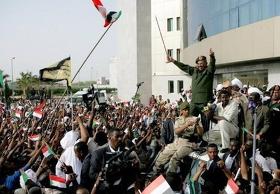
Juba, (South Sudan), April 21: South Sudan will withdraw its troops from the disputed oil town its forces took over last week, the president announced on Friday, pulling back from offensive military action that pushed the south closer to all-out war with its northern neighbor, Sudan.
The statement from President Salva Kiir said the south still believes that the town of Heglig is a part of South Sudan. Kiir said he expects its final status to be determined by international arbitration.
South Sudanese troops moved into and took over Heglig last week, sparking condemnation from the UN, US and Britain. The offensive sent Sudanese troops fleeing, and Sudan's president greatly increased threatening war rhetoric toward the south in the last few days.
South Sudan broke away from Sudan last year after an independence vote, the culmination of a 2005 peace treaty that ended decades of war. Despite the treaty, violence between the two countries has been on the rise, in part because the sides never agreed on the where the border lies, nor how to share oil revenues from the border region.
In the presidential statement he read, South Sudan government spokesman Barnaba Marial Benjamin referred to Heglig by the name the south calls it - Panthou. Military spokesman Col. Philip Aguer said the withdrawal would be completed within three days.
"It doesn't mean we are abandoning the area. If our territory is being occupied we will not wait for the international community," Aguer said. The southern military, known as the SPLA, "will be there to react to any incursions and react of bombardment doesn't stop."
Military aircraft from Sudan have been bombing the border area and into territory that is clearly South Sudan's.
The increased hostilities between two regions that fought decades' worth of civil war has world leaders concerned about a return to war. The Arab League on Thursday announced an emergency session next week to discuss the crisis, while UN Secretary-General Ban Ki-moon urged the sides to step back from the brink of war and return to the negotiating table.
Ban on Thursday called on South Sudan to immediately withdraw from Heglig area, calling the invasion "an infringement on the sovereignty of Sudan and a clearly illegal act." He called on the government of Sudan to immediately stop shelling and bombing South Sudanese territory and withdraw its forces from disputed territories including Abyei.
Last year troops from Sudan moved into the disputed area of Abyei and forced southern troops out of it. The south though, still believes Abyei is its territory. Benjamin said that the withdrawal from Heglig is similar: South Sudan believes it owns the land but is still withdrawing, a move that de-escalates tensions.





Comments
Add new comment